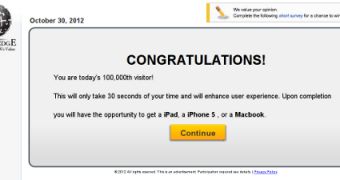As expected, scammers and spammers have already stepped into play, trying to make a profit from those directly or indirectly affected by Hurricane Sandy. Experts have started spotting spam emails advertising all sorts of shady products and services.
One of the unsolicited emails that might land in your inbox these days is entitled “Sandy Got you down? We've got you covered!” Others read “Avoid the Storm, Eat at chillis!” or “Don’t let the storm ruin your dinner plans.”
“Sleep Better and Enjoy the Peace of Mind You Deserve! Get up to $250,000 of Life Coverage as low as $10 Per month! Learn more. Prices are Fixed by Law, So You Cannot Find a Better Price for the Same Product Anywhere!” reads one of the messages.
According to researchers from security firm Sophos, most of the scams that leverage Hurricane Sandy point users to a recently registered website that’s designed to mimic Wikipedia.
However, instead of useful information, victims are met with a sign which informs them that they could win an iPad, and iPhone 5 or a Macbook if they complete a survey.
Those who fall for the trick and agree to complete the survey are requested to provide personal information. Furthermore, they’re also fooled into handing over their mobile phone numbers, a method used to sign up users to premium rate SMS services.
The problem is that the crooks can utilize the information we hand over to commit all sorts of crimes, including identity theft. Not to mention the fact that they earn a commission each time someone completes a survey.
Experts from Solutionary have also come across some malicious emails. However, the ones they’ve identified don’t lure users by promising prizes. Instead, they promise interesting content such as “video of a shark in New York City” and “Massive flood surge caught on video.”
Researchers warn that these types of messages are often utilized to spread malware.
“Scammers use times of crisis to lure victims to watch video footage of a recent event, then infect the victim's computer with malware when they visit the site. Be aware of links to videos and ‘breaking news’ updates online and those sent by email,” Solutionary’s Jeremy Scott explained.
Scott warns those who want to help out the victims of Hurricane Sandy to be careful when asked to make donations.
Never give money to individuals you don’t know personally and never hand out money to those asking for donations via email, Facebook, Twitter, or other social media websites. Ads for charities are also often leveraged by scammers.
Furthermore, always go directly to the websites of trusted charities – such as the American Red Cross – and if you’re planning to give money to an organization you don’t know, check out their references on sites such as fbi.gov, BBB.org, or Charitywatch.org.

 14 DAY TRIAL //
14 DAY TRIAL //